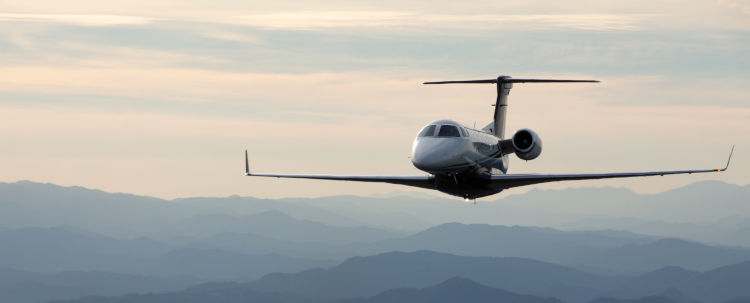The large fractional private jet company is now using only its own aircraft to get its pilots and other crew members in place. This crew ferry program has been developed to limit the exposure of passengers and flight crews to COVID-19.
During normal operations, Flexjet relies on commercial airlines to transport Its pilots to and from flight assignment locations. They meet up with Flexjets fleet of aircraft, which float around the country as flight requests come in from the fractional aircraft owners. The company also noted that taking its pilots and flight crews off of commercial airline carriers, enables it to comply with Centers for Disease Control and Prevention (CDC) recommendations that groups be limited to no more than 10 people for the next few weeks. Flexjet is implementing this effort, internally named Project Lift, for all U.S. domestic flights as well as internationally-bound flights still permitted by the U.S. and other governments.

“Historically, flight crews in both commercial and private aviation regularly have used commercial airlines to travel from their home base to reunite with their aircraft for their flight assignment,” said Flexjet Chairman Kenn Ricci. “But, given the threat posed by the novel coronavirus and the illness COVID-19, we felt it was in the best interests of our Owners and flight crews to take this risk out of the equation and transport our flight crews on our own aircraft, which have been treated with MicroShield 360, a protective coating that kills 99.99 percent of pathogens.”
In order to implement the program, Flexjet pilots and flight crews will drive to one of seven strategically located hubs around the country, where they will be ferried aboard a controlled and select group of Flexjet aircraft to reunite with their flight assignments. Through careful scheduling, using Flexjet’s proprietary software, and extension of tour lengths, the new shuttle system will remove flight crews from the commercial airlines with minimal disruption.
Flexjet also normally has crews fly on a specific aircraft as part of its Red Label service. But they told us "Dedicated crewing is being relaxed only for Project Lift during the extreme circumstances of the coronavirus pandemic. This helps us ensure the safest possible outcome, for flight crews and Owners alike. However, once normal conditions return, dedicated crewing will return to being the standard for Red Label."
“Decisions about safety can never be made based on their impact on the bottom line,” said Ricci. “There’s no doubt that this will have a cost impact on Flexjet, but it’s the right thing to do for our employees and it’s the right thing to do for our Owners as we move ahead through this global crisis.”
This change comes after several reports of passengers with coronavirus traveling on commercial aircraft. For instance, JetBlue banned a passenger who flew from New York to Florida while awaiting the results of a coronavirus test. Another passenger on a Delta flight out of JFK Airport in New York had coronavirus and was contagious. A (now former) Biogen employee with the virus flew from Boston Logan Airport and caught a connecting flight in Los Angeles on her way to Beijing, China. So Flexjet is certainly avoiding any other incidents like this by keeping all its crew on its own aircraft.
To further safeguard passengers and crew, Flexjet has just become the first operator, in either commercial or private aviation, to treat its fleet with MicroShield 360.
This proprietary EPA-registered, FDA-approved antimicrobial coating system constantly reduces microbial contamination of bacteria, viruses, mold, algae, yeast, mildew, fungi and odors. It can play an important role in helping to protect passengers and crew from a wide range of illnesses including MRSA, E. coli, Norovirus, C. diff, flu strains, gram-positive and gram-negative bacteria, enveloped viruses including the common cold and more than 90 additional diseases and conditions.
The MicroShield 360 was applied by Flexjet sister company Constant Aviation, one of the country’s largest Maintenance, Repair and Overhaul businesses (MROs). We checked in with David Davies, CEO, Constant Aviation who told us “Given the novel Coronavirus is only months old, we do not know whether the MicroShield 360 coating also kills the novel coronavirus specifically, but are currently testing the product’s effectiveness against the novel coronavirus in a laboratory setting. We are optimistic that the outcome will be favorable as it has proven extremely effective against all unwanted microbes for which it has been tested against to-date.”
It's reassuring to see Flexjet responding so rapidly to the new coronavirus problems that are affecting all aspects of private aviation.

